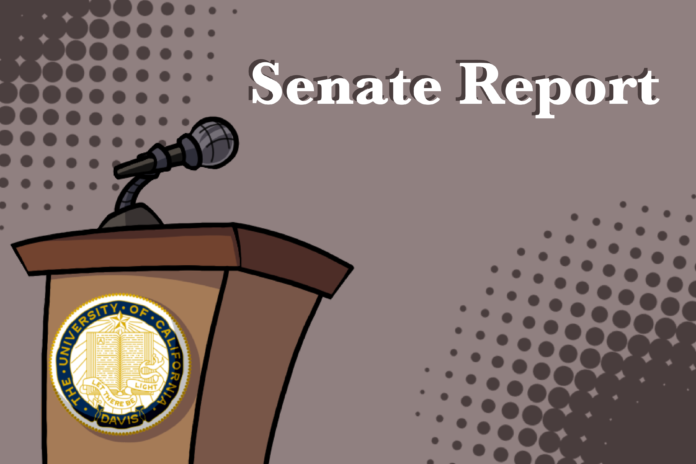The university prepares for COVID-19 outbreaks by setting aside a 400-bed facility to house quarantined students
The Oct. 1 ASUCD virtual special senate meeting was called to order at 5:56 p.m by Vice President Emily Barneond.
Chancellor May kicked off ASUCD’s first meeting of the academic year by addressing COVID-19 outbreak prevention on the campus, as other universities throughout the country experience an uptick in cases.
A roughly 400-bed facility located at Primero Grove will work as quarantine and isolation for students who test positive for the virus, said May.
Senator Hunter Ottman asked what the threshold would be to change mitigation plans if an outbreak occurs.
“I would say if we get anywhere close to the 400 beds at Primero Grove, I think we need to be doing something else,” May said. “But we’re still working out at what levels we take different actions.”
There are a total of 35 courses being taught in-person on campus, with the remaining remote for fall. Approximately 2,600 students are in residence halls or other student housing for this quarter, May said.
“We’re trying to be very transparent about who’s being tested on campus,” said Kelly Ratliff, the vice chancellor of finance operations and administration. “And then we’re also tracking cases for people in our community, even if they might be working remotely.”
The UC Davis safety services dashboard shows 84 confirmed cases between faculty and staff with 24 considered active as of Oct. 11.
A mobile-friendly daily symptom survey is required for anyone entering the campus, but it relies on self-reporting.
“Just as with wearing masks and distancing, the daily symptom survey relies on the honor system and everyone doing their part to help prevent the spread of the virus,” May said.
COVID-19 testing is currently only being done at one location, however, May said that they are looking to expand to another location close to the Mondavi Center.
Ratliff said the administration is adapting their strategies as they learn more, but up until this point, it has worked better to combine multiple smaller testing into one site at the Pavilion parking garage.
The ASUCD proposed budget was presented by Senate Controller Alexis Eduardo Lopez-Perez. The presentation reviewed potential cuts to programs related to events and on-campus services to balance the budget as revenues fall due to the ongoing pandemic.
“We don’t want to be the cause of the COVID-19 outbreak, even if we were allowed to do in-person events,” Lopez-Perez said in reference to the elimination of events that the ASUCD would normally host.
The “Basic Needs and Services Referendum” passed in Winter Quarter was used to recoup approximately $2 million in losses the senate sustained in Spring Quarter when the pandemic caused a sudden shutdown of the campus, Lopez-Perez said.
The proposed budget was referred to the Business and Finance Commission for review.
Senator Mahan Carduny questioned the chancellor on how students are being compensated for the closure of recreational facilities on campus and change in the traditional format for courses.
“I mean, I have a professor this quarter reusing lectures from spring quarter, and it just doesn’t seem necessarily fair,” Carduny said.
Currently, there is an ongoing lawsuit related to refunding fees that were charged for on-campus services students were unable to take advantage of due to pandemic closures.
May relayed to Muhan that the state mandates tuition and that he does not have the authority to affect the cost of tuition.
“I will say this, setting aside the one professor you mentioned, the vast majority of your instructors and faculty are working probably harder than they have ever worked to deliver the remote instruction in a reasonable way,” May said.
Fees, which are not regulated by the state, are bundled in a way that makes it difficult to assess reductions and maintain facilities, May said.
“It’s not like you paying for a service; it’s not like you buy a movie ticket to go in,” May said. “It’s bundled with several other services, it’s bundled with the debt service to pay for facilities, so it’s not easy to pull that out and separate it.”
Written by: Kathleen Quinn — campus@theaggie.org



